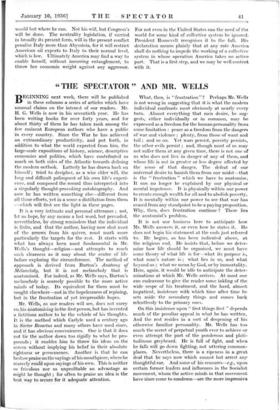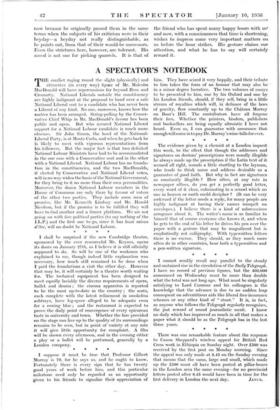" THE SPECTATOR " AND MR. WELLS
BEGINNING next week, there will be published in these columns a series of articles which have unusual claims on the interest of our readers. Mr. H. G. Wells is now in his seventieth year. He has been Writing books for over forty years, and for about thirty of them he has taken rank among the few eminent European authors who have a public in every country. Since the War he has achieved an extraordinary productivity, and put forth, in addition to what the world expected from him, the large-scale expositions of history, science, descriptive economics and politics, which have contributed so much on both sides of the Atlantic towards defining the modern outlook. Latterly he has drawn back on hiMself ; tried to decipher, as a wise elder will, the long and difficult palimpsest of his own life's experi- ence, and composed the record thus interpreted into a singularly thought-provoking autobiography. And now he has written something else—different from all those efforts, yet in a sense a distillation from them —which will first -see the light in these pages.
It is a very intimate and personal utterance ; not, let us hope, by any means a last word, but pervaded, rieverthelesS, by strong reminders that the individual is finite, and that the author, having now shot most of the arrows from his quiver, must mark more particularly the targets for the rest. It starts with what has always been most fundamental in Mr. Wells's thought—religion—and attempts to reach such clearneSS as it may about • the centre of life before exploring the circumference. The method- of approach is derived from Burton's Anatomy of Melancholy, but it is not melancholy that is anatomised. For indeed, as Mr. Wells says, Burton's melancholy is scarcely possible to the more active minds of today. Its equivalent for them must be Sought elseWhere—not in the hopelessness of repining, but in the frustration of yet irrepressible hopes.
Mr: Wells; EIS our readers will see, does not carry on hiS anatomising in the first person, but has invented a fictitious author to be the vehicle of his thoughts. It is the - method Which Carlyle used a century ago in &irtor Resartus and many others have used since, and it has obvious'conVeniences. One is that it does not tie theauthor down too rigidly to what he Pro- pounds it enables him to throw his ideas on the screen' without implying his belief in their absolute rightneSs or permanence. Another is that he can beaow praise On the sayings. of his mouthpiece, where he scarcely could upon sayings of his own. This is neither so frivolous nor so unprofitable an advantage as might be thought ; for often to praise an idea is the best 'way to secure for it adequate attention. What, then, is " frustration " ? Perhaps Mr. Wells is not wrong in suggesting that it is what the modern individual confronts most obviously at nearly every turn. Almost everything that men desire, he sug- gests, either individually or in common, may be expressed as a freedom for the human personality from some limitation : peace as a freedom from the dangers of war and violence ; plenty, from those of want and toil ; and so on. Yet wars persist, poverty persists, the other evils persist ; and, though most of us may not suffer them at any given time, there is not one of us who does not live in danger of any of them, and whose life is not in greater or less degree affected by the sense of that danger. The defeat of our universal desire to banish them from our midst—that is the " frustration " which we have to anatomise. It can no longer be explained by our physical or mental impotence. It is physically within our power to create enough wealth for all and to abolish poverty. It is mentally within our power to see that war has ceased from any standpoint to be a paying proposition. Why, then, does frustration continue ? There lies the anatomist's problem.
It is not our business here to anticipate how Mr. Wells answers it, or even how he states it. He does not begin his statement at the ends just referred to. He begins, as has been indicated above, at the religious end. He insists that, before we deter- mine how life should be organised, we must have some theory 'of what life is for—what its purpose is, what man's nature is ; what lies in us, and what beyond us ; what we mean by God, or by immortality. Here, again, it would be idle to anticipate the deter- minations at which Mr. Wells arrives. At most one can endeavour to give the reader some inkling of the wide scope of his treatment,' and the hard, almost Impatient, insistence with which time after time he sets aside the secondary things and comes back relentlessly to the primary ones.
On this insistence upon " first things first " depends much of the peculiar appeal in what he has written. And the rest resides in a sort of deepening of his otherwise familiar personality. Mr. Wells has too much the secret of perpetual youth ever to achieve or even attempt the part of the ponderous and plati- tudinous greybeard. He is full of fight, and when he falls will go down fighting, not uttering 'common- places. Nevertheless, there is a ripeness in a great deal that he says now which cannot but arrest any thoughtful ear. And some of his censures—e.g., upon certain former leaders and influences in the Socialist movement, whom the active minds in that movement have' ave Since come to condemn—are the more impressive now because he originally pasSed them in the same terms when the subjects of his criticism were in their heyday—a heyday not really distinguishable, as he points out, from that of their would-be successors. Even the strictures here, however, are tolerant. His mood is not one for picking quarrels. It is that of the friend who has spent many happy hours with us' and now, with a consciousness that time is shortening, wishes to impress some very important matters on us before the hour strikes. His gesture claims our attention, and what he has to say will certainly reward it.











































 Previous page
Previous page